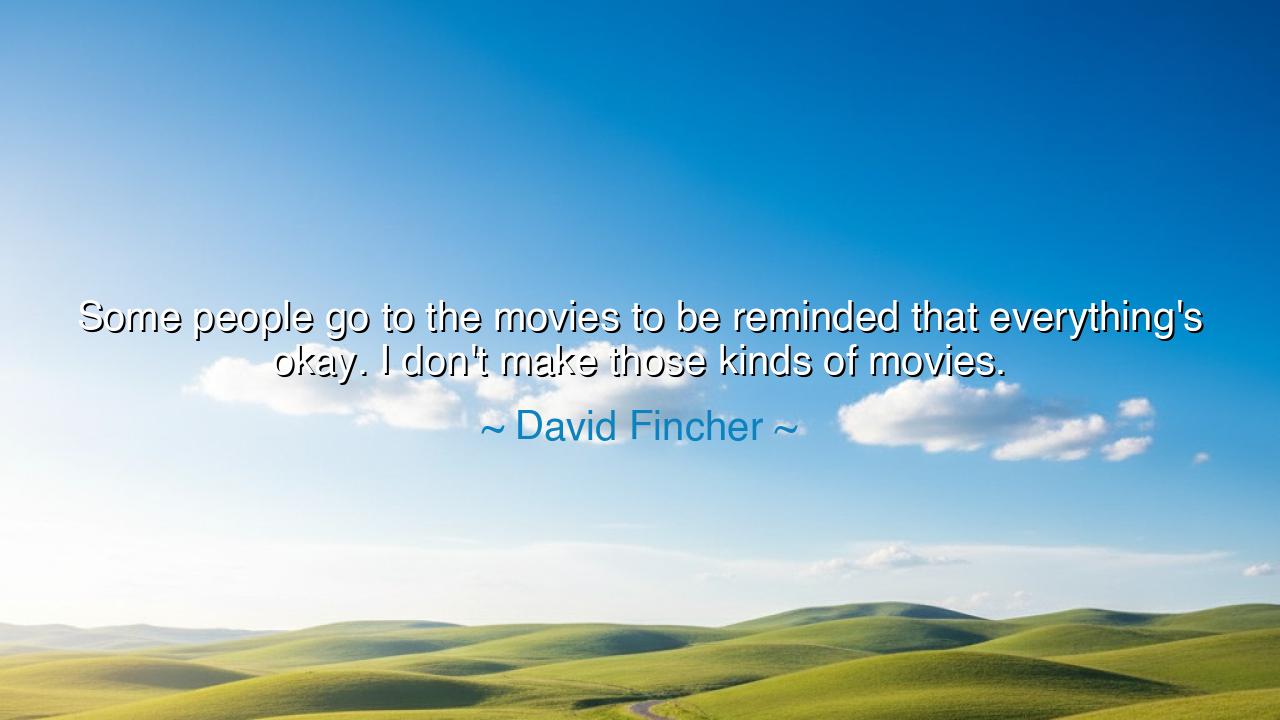
Some people go to the movies to be reminded that everything's
Some people go to the movies to be reminded that everything's okay. I don't make those kinds of movies.






Listen closely, children, for the words of those who seek to uncover the deeper truths about life and humanity often hold lessons that are difficult to grasp but essential for growth. David Fincher, a director known for his dark, intricate, and often unsettling films, once said: "Some people go to the movies to be reminded that everything's okay. I don't make those kinds of movies." In these words, Fincher speaks to a profound truth about the nature of art and the human condition—that sometimes, we do not go to art for comfort or reassurance, but for confrontation. The art that challenges us, that forces us to question and reflect, has a deeper power to heal and transform than the art that simply seeks to calm our fears or reaffirm what we already know.
In the ancient world, the purpose of storytelling was not always to entertain, but to teach and to confront the audience with the complexity and difficulties of life. The Greek tragedies, for example, were filled with suffering—Oedipus, Antigone, and Prometheus were all figures whose stories did not offer easy resolutions or comforting answers. Instead, these stories were meant to shake the soul, to remind the people that life was fraught with perils, tragic flaws, and the uncontrollable forces of fate. Yet, it was in confronting these difficult truths that the people of ancient Greece gained wisdom and clarity. Just as Fincher does not make films that offer easy comfort, the ancient storytellers crafted tales that made the audience face the harsh realities of life, knowing that only through such confrontation could true growth occur.
Consider the story of Achilles in the Iliad. He is the greatest warrior of the Greeks, yet his journey is filled with anger, pride, and suffering. There is no easy resolution to his inner turmoil, and his choices lead to death and destruction. The ancient Greeks did not seek to make Achilles a comforting figure; rather, they sought to show the complexity of heroism, the price of glory, and the way in which pride can lead even the mightiest down a path of ruin. The Iliad does not offer a simple reassurance that “everything will be okay”; it forces us to confront the flaws in even the most noble of characters, revealing that true heroism is not just about victory, but about facing the consequences of one's actions.
In the same way, Fincher’s films, such as Se7en, Fight Club, and The Social Network, are not concerned with offering audiences comfort or a neat resolution. They delve into the darker corners of the human psyche, showing us the anger, the alienation, and the desperation that many people experience in their lives. The characters in Fincher’s movies do not find simple answers or redemption. They are not heroes in the traditional sense. Instead, they are flawed, and they wrestle with their inner demons in a way that challenges the audience to reflect on their own fears, frustrations, and failures. By confronting these truths, Fincher’s films force the audience to engage with the complexity of the world, just as the ancient tragedies asked their audiences to do.
This brings us to a critical lesson, children: true growth does not come from avoiding discomfort or seeking easy answers. Just as the ancients understood that the greatest lessons often come from confronting suffering and chaos, so too must we learn that life’s most profound insights often come from acknowledging the darkness within ourselves and the world around us. The world is not always as it seems, and to face the reality of life’s challenges—with all its uncertainty, conflict, and loss—is to understand the truth in a deeper, more meaningful way. Fincher reminds us that comfort is not the goal of great art or storytelling. Instead, it is the willingness to face hard truths that transforms us.
Consider the Roman philosopher Seneca, who believed that suffering and adversity were not to be avoided, but embraced. For Seneca, it was only by confronting difficulty head-on that one could truly understand the nature of life. He wrote, "A gem cannot be polished without friction, nor a man perfected without trials." In much the same way, Fincher’s films do not shy away from the harshness of life; rather, they force us to see it clearly, knowing that only through this acknowledgment can we find meaning. To watch a Fincher film is to confront the uncomfortable, to be challenged, and to walk away with a deeper understanding of the complexity of human existence.
Children, remember this: in a world that often seeks to numb its pain with distractions and comforts, the greatest growth comes when we face the hard truths of life. Do not turn away from the shadows that exist within yourself or the world around you. Whether in art, relationships, or the challenges you face, seek not to be comforted by empty assurances, but to be awakened by the truth. Confront the darkness, for it is in that confrontation that you will find the light—the true wisdom that will guide you on your journey.






AAdministratorAdministrator
Welcome, honored guests. Please leave a comment, we will respond soon